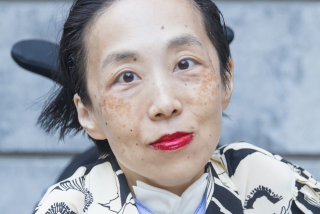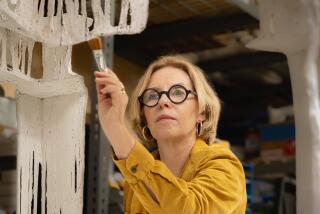Book Seeks to Soothe the Emotional Pain Caused by Birth Defects : Coping: After her daughter was born with a cleft lip, Sandy Peckinpah resolved to help families of similarly affected children deal with the problem of looking different.
- Share via
Sandy and David Peckinpah were in the delivery room of Westlake Hospital, video camera rolling, thrilled at the imminent birth of their daughter. Suddenly came the baby’s loud cry, a concerned look on the physician’s face and Sandy knew something was wrong.
David turned to her and said, “Sandy, she really is . . . beautiful . . . and we’ll take care of her,” and then Sandy saw that her daughter was born with a cleft lip.
About one in 600 babies is born with a cleft lip or a cleft palate. Most parents are unprepared for such a defect, which is not picked up by amniocentesis. And while surgeries and treatments are available to restore a cleft lip or cleft palate so that it looks normal--with only a small scar visible--the shock of the birth defect is usually difficult for a family to cope with initially.
Although plenty of information about cleft palates is available to parents, there is little that addresses the emotional challenge such a defect poses. A year after Sandy’s daughter Julianne was born, Sandy decided to write a book for parents and their children to help them accept the problem of looking different. The Peckinpahs paid Scholars Press to publish “Rosey . . . The Imperfect Angel” ($15.95), which just came out.
Sandy was stunned at first by the appearance of Julianne’s face, and she felt robbed of the joy of childbirth. On that day in January, 1989, when her daughter was born, Sandy cried all night, wondering how her daughter would cope with the challenge of looking different. “I felt different from every other parent in the world,” she said.
Sandy and David, both 39, had had what Sandy calls a “fairy tale existence,” with two sons, Garrett, 13, and Trevor, 9; a big, beautiful house in Westlake and good health. David, nephew of film director Sam Peckinpah, had a successful career as a television writer and producer. Then, suddenly, Sandy’s “perfect world” collapsed as she faced the imperfection in her new baby. “It’s the loss of your dream of what the perfect baby will be,” she said.
Soon she got the medical information she needed, learned what surgeries Julianne would have in the year to come--and later--to correct the birth defect. She was given pamphlets on the problems, phone numbers of the Cleft Palate Foundation and parent support groups, and was introduced to members of the cleft palate treatment team at St. John’s Hospital and Health Center in Santa Monica.
But as the weeks went by, Sandy searched for something that could help her cope with her disappointment and guilt--”I kept thinking that maybe I shouldn’t have ridden my horse those weeks before I even knew I was pregnant”--and for some sort of big-picture explanation.
She also found it difficult to share her thoughts and fears with David. She felt that their marriage was strained by their inability to talk about the stress and the disappointment in the situation. “I thought my job was to be the cheerleader,” she said.
Sandy remembers taking Julianne to the grocery store, watching people walk up to the baby, smiling, saying, “Let’s see this beautiful little girl,” and then, shocked by her deformity, back away. Sandy learned to tell people about Julianne’s cleft lip as they approached so they wouldn’t be surprised.
She also remembers the comments of well-meaning friends, such as: “Well, it can be fixed, can’t it?” or “You should feel lucky it wasn’t something worse.” After Julianne’s first surgery had partially healed, leaving the skin still very pink, Sandy heard a woman at the park say to Julianne: “You poor thing! Didn’t your mommy wipe your nose when you had a cold?”
She found herself wishing that she could help people see what she was struggling with. So Sandy decided to write a fairy tale to explain to parents and children, and someday to Julianne, that being imperfect can be a positive thing. “I wanted her to be able to go to school armed with her own fairy tale, the hero of her own story,” Sandy said.
She was already taking a course on fairy tales from Sally Jordan, a Woodland Hills educator and former headmistress of Viewpoint School in Calabasas. Sandy felt that a fairy tale would be just the thing to help people recognize and deal with their feelings.
The book is about a little angel with a cleft lip in the Land Called Above who is found crying by other little angels because she feels different from the others. The first angel, Rosey, is assigned a challenging task by the Boss Angel--and succeeds--and her reward is to be sent down to Earth as a beautiful newborn. The story ends with Rosey’s new family declaring that its new baby Rosey--who has a cleft lip--is beautiful.
Nancy C. Smythe, executive director of the Cleft Palate Foundation in Pittsburgh, said the book will fill a special need for parents of children with cleft deformities. “There have been more technical books published, but never in an emotional support angle. Just to know that the birth defect is so common that it would warrant a book in print should help parents,” she said.
What Smythe likes about the book is what Sandy Peckinpah most wanted to convey: the message that it’s all right to be different. What she said parents will need is a sequel to the book that describes the feelings parents have as they cope with the lip repair surgeries.
On the eve of Julianne’s first lip repair surgery, Sandy said she was shocked to find that she was sad. She knew that she would never see Julianne again as she had grown to know her. She wasn’t prepared for the emotional tug she felt after the surgery when Julianne looked not only swollen from the surgery, but so different from the way she had always looked before.
“It was like getting to know a new face,” Sandy said.
But rather than write a follow-up to Rosey, Sandy plans to develop a series of books aimed at children with different deformities. Her next self-published book, “Chester, the Imperfect All-Star,” will be about a little boy who has one leg shorter than the other.
Now Julianne romps about the house cheerfully, greeting guests with the detached interest typical of children who are almost 2. Her first surgeries have gone well; she has two to go, but she doesn’t seem self-conscious.
Sandy’s wounds too seem to have healed. “It was absolutely the worst time of our lives, but it has become the most wonderful thing. Julianne’s cleft lip has given us a new look at life, focusing now on the family, the inner beauty, and Julianne taught me to really enjoy right now and appreciate what I’ve been given. Julianne has a spirit that is really unmatched.”
More to Read
Sign up for our Book Club newsletter
Get the latest news, events and more from the Los Angeles Times Book Club, and help us get L.A. reading and talking.
You may occasionally receive promotional content from the Los Angeles Times.







